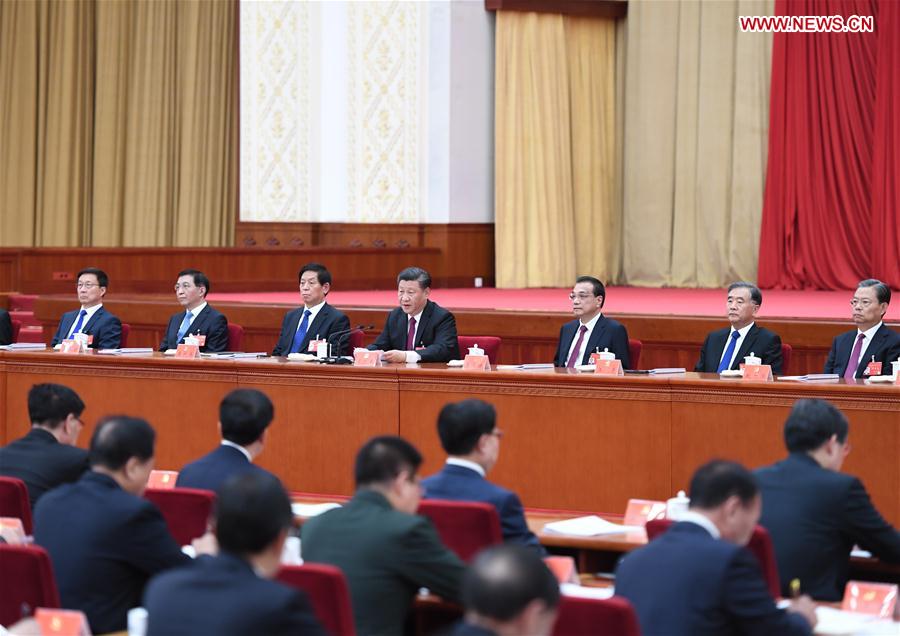Leaders commit to modernizing government
By Andrew Moody | China Daily Global | Updated: 2019-11-04 08:56

Party plenum correct to focus on improving governance at historic juncture, analyst says
Chinese leaders have made a commitment at an important Party meeting to modernize the country's governance system and deliver better government.
The Fourth Plenary Session of the 19th Communist Party of China Central Committee concluded on Thursday after four days of discussions. The focus of the meeting was on improving how China is governed.
Xi Jinping, general secretary of the CPC Central Committee, set the agenda for the plenary session when he delivered a speech to a symposium on Sept 25, the contents of which were made public on Friday.
"What we need to do now is to advance the modernization of China's system and capacity for governance in the practice of upholding and improving the system of socialism with Chinese characteristics," he said.
Xi also said at the symposium that the plenary session was to be held at a historic juncture, in terms of realizing China's two centenary goals - to become a moderately prosperous society by 2021, the 100th anniversary of the founding of the CPC, and being a modern socialist country in every respect by 2049, which will mark 100 years since the founding of the People's Republic of China.
Wang Huiyao, founder and president of the Center for China and Globalization, a Beijing-based think tank, said the leaders were right to emphasize the modernization of China's government system.
"The country is making the transition from an emphasis on high-speed to high-quality growth. This can only be achieved with improvement to the government model and procedures," he said.
Wang, also a counselor to the State Council, China's Cabinet, said this transition will need new key performance indicators.
"In the past we emphasized GDP growth, but now we need to judge our performance by other criteria such as the protection of the environment, sustainable development and delivering a better life for our people. This is the essential message of the plenum," he said.
Zhu Ning, deputy dean and professor of finance at the Shanghai Advanced Institute of Finance, hoped modernization would lead to an abandonment of GDP targets in the 14th Five-Year Plan (2021-25).
"This is something the IMF has been pressing for, for a number of years, and we could move to a situation where the government issues forecasts for growth and not targets. This would enable the government's efforts to be directed in other areas," he said.
The plenary session emphasized the importance of Party leadership in China's modernization.
That the system was the result of the Party and the people working together was made clear in a communique released after the plenary session.
"The system of socialism with Chinese characteristics is a scientific system developed by the Party and the people through their long-term practices and explorations," it said.
Ma Liang, a professor of public policy at the National Academy of Development and Strategy at Renmin University of China in Beijing, said the Party's lead role in reform was vital.
"This is often misunderstood outside of China, but by putting the Party in the center it is easier to streamline the various government agencies and deliver services to the people more efficiently," he said.
Ma said the plenary session was right to emphasize the role of technology in the more efficient delivery of government services. Xi told a study session of the CPC Central Committee Political Bureau on Oct 25 about the role that blockchain technology, which will aid cryptocurrency transactions and data storage, may play in the delivery of government services.
Ma added, "To improve the capacity of the government system, we need to improve our use of technology, particularly information technology and the use of blockchain technologies."
Ma believes progress has already been made and was impressed after a recent visit to the Beijing Government Affairs Service Center
"If you want to set up a company in Beijing you can go there and do it all in one day. You also find out about any preferable policies that might be available to you. You don't have to visit all the different agencies as before. It is a hub for all the agencies," he said.
Zhu at the Shanghai Advanced Institute of Finance said the private sector in particular will welcome better delivery of government services.
"Private companies want a level playing field with State companies, and if setting up a company, paying taxes and accessing government services improves, that can only help. It is important to restore confidence to the private sector. It is critical to the success of the economy."
Louis Kuijs, head of consultancy Asia for Oxford Economics, also welcomed moves to modernize China's government system.
"The more developed and sophisticated an economy and also the agents in that economy, the harder it is for the government to run everything," he said.
Kuijs said he believed China's system had undeniable strengths.
"I am not an unbridled laissez faire type of a person. It is perfectly legitimate for the government to play an important role in the economy, but there ought to be more of a distinction between where that ends and business starts," he said.
Wang at the Center for China and Globalization believes that by better governance, China will meet its centennial targets and be on the road to national rejuvenation.
"As we move away from an economy that has been export-led and reliant on investment to one based on new technologies such as (artificial intelligence) and 5G, the government model also needs to change and be enhanced," he said.
























